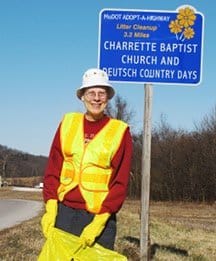Jan. 1 not only marked the beginning of a new year, but also saw the first Baby Boomers turn 65 years old. And congregations face the evolving challenge of finding ways to minister with and to them.
 |
Boomers—born between 1946 and 1964—comprise the largest generation in U.S. history at 78 million strong, and they don’t approach growing older in the same way their parents did.
“Boomers were a generation of change,” noted Mark Seanor, minister to experienced adults at First Baptist Church of Huntsville, Ala. “They don’t want what their parents do in ministry.”
Many Boomers want to keep working past retirement, but in areas of interest and to make a difference. They want to stay young and are searching for productive and meaningful purpose, notes Amy Hanson in Baby Boomers & Beyond: Tapping the Ministry Talents & Passions of Adults Over Fifty.
Boomers often are characterized as people on a personal quest who seek self-actualization and self-discovery throughout life, explained Frank Fain, director of educational services for The Baptist Home.
As older adults, members of this generation are more energetic, healthier and still want to change the world, Fain added. “They want their life to matter. … Older Boomers in particular … don’t want to serve the institution not just for the institution’s sake. They want to serve … to make a difference in the world.”
The differences between Boomers and the generation before them mean churches should rethink the way older adult ministry is done—beginning with the name. Boomers don’t want to be called senior adults, and churches have responded by using terms such as second half, 55-plus, older adult and emerging adult ministry. Some churches are shifting from a SAM—senior adult ministry—focus to BAM—Boomer adult ministry.
But Boomer ministry must be more than simply a name change. Churches must recognize Boomers are distinctively different, Fain said.
Boomers still are the “me generation,” Keith Lowry, adult consultant for the Baptist General Convention of Texas, said. “Effective ministry will have to deal with that, but (it) also takes advantage of the tremendous gifts and talents they bring.”
Churches may find they need to divide older adults for some activities and projects. “I realized Boomers are not going to consider themselves as senior adults … and I stopped fighting to merge them,” explained Melissa Fallen, associate pastor for senior adults and pastoral care at Huguenot Road Baptist Church in Richmond, Va.
“I see an opportunity for the church … to help Boomers … make this time meaningful,” she added.
If the church doesn’t, Boomers likely will look elsewhere for meaning. “They want to be involved in specific causes,” noted Ken Kessler of the Baptist General Association of Virginia. “The key word to me is ‘engage.’ Engage them instead of just having them sit back.

Ruth Ann Short, an emeritus missionary to Nigeria, was featured in the Missouri Department of Transportation’s “No MOre Trash” publicity campaign last year. She participates in the Adopt-a-Highway project while she logs an average of 10,000 steps per day. As she picks up trash, she prays for the households and businesses along the roads and for litterbugs.
|
“The church has to take the opportunity … to engage them in meaningful ministry … or they are going to flee and find meaningful places to serve.”
As congregations minister to Boomers, they should start by talking with them and with all older adult groups.
Steve Whisler became senior adult minister at Second Baptist Church in Springfield last August. He admits he still is formulating how to tackle the Boomer issue without older members feeling abandoned. He believes conversation is the place to start.
“Get to know and be known among the senior adult population,” he said. “We did a survey just to see what service people were interested in, and we’re using the survey results as one more listening tool.”
He has talked with nearly every Bible study class teacher and director to understand needs and to hear others’ opinions. “I didn’t know where to begin until I listened and assessed,” he said. “You can’t come in with a plan. How do you know what to do until you listen and assess?”
Education is another key. Educate the church about older adult needs and desires. Help emerging and older adults understand one another.
Allow Boomers to determine their ministry. “It must be grassroots,” Fain explained. “Boomers are saying, ‘This ministry is for us and is going to be done by us.’”
Mark Seanor in Alabama added churches need to develop awareness among members and leaders about the Boomers and their differences. Even though some Boomers have been included in older adult ministry for 10 years—the oldest turned 55 in 2001—“There is still a long way to go,” he said.
The ministry needs to become a priority, Seanor added. “You need to listen to them and work with them and develop ministry from within.”
A conference to address the uniqueness of Boomer ministry will be held at Baylor University in September.

